Eisenhower death camps
In the spring of 1945, the third Adolf Hitler Reich was on the verge of death, crushed by the Red Army, advancing westward towards Berlin and the American, British and Canadian armies under the command of General Dwight Eisenhower, advancing eastward along the Rhine. From the date of the landing in Normandy in June last year, the Western allies won France and small European countries, and some Wehrmacht commanders were ready for local capitulation. Other units, however, continued to obey Hitler's orders to fight to the last. Most of the infrastructure, including transportation, was destroyed, and the population roamed in fear of the Russians approaching.
“Hungry and frightened, lying in the fields fifty feet away, ready to give up to fly away” - So the captain of the Second Anti-Tank Regiment of the Second Canadian Division HF McCullough describes the chaos of Germany’s surrender at the end of the Second World War. For one and a half days, according to statements by Field Marshal Montgomery, 500 000 of the Germans surrendered to his 21 Army Group in northern Germany.
Shortly after Victory Day - May 8, British-Canadian troops captured more than 2 millions. Virtually nothing about their treatment has been preserved in the archives of London and Ottawa, but some scant evidence from the International Committee of the Red Cross, the relevant military personnel and the prisoners themselves indicate that the prisoners felt excellent. In any case, many were quickly released and sent home, or transferred to France for post-war reconstruction work. The French army itself captured the Germans around 300 000.
Like the British and Canadians, the Americans unexpectedly met with a huge number of surrounded German troops: the total number of prisoners of war only among the Americans reached 2,5 millions, without Italy and northern Africa. But the attitude of the Americans was very different.
Among the first US prisoners of war was Corporal Helmut Liebig, who served in the anti-aircraft experimental group at Peenemunde in the Baltic. Liebig was captured by Americans on April 17 near Gotha in central Germany. Forty-two years later, he distinctly recalled that in the camp of Goth there were not even awnings, only a barbed wire fence around the field, which soon turned into a marsh.
The prisoners received a small portion of food on the first day, but on the second and subsequent days it was cut by half. To get her, they were forced to run through the line. Hunched up, they fled between the ranks of the American guards, who beat them with sticks as they approached food. 27 April, they were transferred to the American camp Heidesheim, where for several days there was no food at all, and then only a little bit.
In the open, starved, thirsty, people began to die. Liebig counted daily from 10 to 30 bodies, which were pulled out of his section B, which contained about 5 200 people. He saw one prisoner beat another to death because of a small piece of bread.
One night, when it was raining, Liebig noticed that the walls of the hole dug in the sandy ground for shelter had fallen upon people who were too weak to get out from under them. They suffocated before their comrades came to the rescue ...
The German newspaper, Rhein-Zeitung, so called this photograph that had survived from the Americans, placed on its own strip: Camp in Sinzig-Remagen, spring 1945.
Liebig sat down and wept. "I could not believe that people were so cruel to each other."
Typhus broke into Heidesheim in early May. Five days after Germany’s surrender, 13 May, Liebig was transferred to another American prisoner of war camp, Bingem-Rudesheim in Rhineland, near Bad Kreusnach. The prisoners there contained 200 - 400 of thousands, without shelter, practically without food, water, medicine, in terrible cramping.
Soon he fell ill with typhus and dysentery at the same time. He, half-conscious and delirious, was taken with sixty prisoners in an open carriage to the north-west, down the Rhine, on a tour of Holland, where the Dutch stood on bridges and spat on their heads. Occasionally, American guards fired warning shots to drive the Dutch away. Sometimes not.
After three days, the comrades helped him to reach the large camp in Rheinberg, near the border with Holland, again without shelter and practically without food. When some food was delivered, it turned out to be rotten. In none of the four camps did Liebig see any shelters for prisoners — they were all located under the open sky.
According to the remaining evidence from the medical service, the death rate in American camps for German prisoners of war in the Rhineland was about 30% in 1945 year. At that time, the average mortality rate among the civilian population of Germany was 1-2%.
One day in June, through hallucinations, Liebig saw "Tommy" entering the camp. The British took the camp under their guard, and this saved Liebig's life. Then he, while growing 5 feet 10 inches, weighed 96,8 pounds.
Eisenhower CAM SIGNED AN ORDER TO CREATE A CATEGORY OF PRISONERS, NOT SUBJECT TO THE GENEVA CONVENTION.
According to the stories of ex-prisoners of Rheinberg, the last action of the Americans before the arrival of the British was to level one section of the camp with a bulldozer, and many of the weakened prisoners could not leave their burrows ...
According to the Geneva Convention, prisoners of war were guaranteed three important rights: that they should be fed and placed according to the same standards. that the winners must be able to receive and send mail and that they must be visited by delegations of the International Committee of the Red Cross, who must compile secret reports on the conditions of detention to the Protecting Party.
(In the case of Germany, since its government was dissolved in the final stages of the war, Switzerland was appointed the Protecting Party).
In fact, the German prisoner army of the United States denied these and most other rights by a series of special decisions and directives adopted by its command at SHAEF - Supreme Headquarters, Allied Expeditionary Force - Allied Expeditionary Forces Headquarters.
General Dwight Eisenhower was both the supreme commander of the SHAEF - all the Allied armies in northwestern Europe, and the commander-in-chief of the US Armed Forces at the European theater of operations.
He submitted to the Joint Command of the United States and Britain (CCS), the United Command of the United States (JCS), as well as the policy of the US Government, but due to the lack of relevant directives, all responsibility for the treatment of German prisoners lies entirely on him.
“God, I hate the Germans,” he wrote to his wife, Mamie, in September 1944. Earlier, he told the British ambassador in Washington that all 3 500 officers of the German General Staff must be "destroyed." In March, 1945 in a letter to CCS, signed by Eisenhower, recommended the creation of a new class of prisoners - Disarmed Enemy Forces - DEF - the Disarmed Adversary Forces, which, unlike prisoners of war, did not fall under the Geneva Convention. Therefore, they should not have been supplied by the victorious army after the surrender of Germany.
It was a direct violation of the Geneva Convention. In a letter from 10 March, in particular. argued: "The additional load on the supply of troops, caused by the recognition of the German Armed Forces as prisoners of war, requiring their provision at the level of the basic military ration, lies far beyond the limits of the Allies, even with all the resources of Germany." The letter ended: "Your approval is required. Plans will be made on this basis."
26 April 1945 Joint Command approved DEF status only for prisoners of war in the hands of the US Army: British command refused to accept the American plan for its prisoners of war. CCS decided to keep the status of disarmed German troops in secret.
At the same time, the Chief Quartermaster of Eisenhower at SAEF, General Robert Littlejohn, already halved the ration for prisoners and the letter from SAEF addressed to General George Marshall, Commander-in-Chief of the US Army, signed by Eisenhower, said that there would be no roof, other amenities ... ".
However, the reason was not the supply. In Europe, there were plenty of materials in warehouses to build acceptable camps for prisoners of war. Eisenhower's adjutant on special issues, General Everett Hughes, visited the huge warehouses in Naples and Marseilles and reported: "More supplies than we can ever use. Extend within sight." That is, the food was not the cause either. The stocks of wheat and corn in the United States were as great as ever, the potato harvest was also a record.
In the army reserves there was such a supply of food that when a whole warehouse center in England stopped supplying after an accident, it was not noticed for three months. In addition, the International Committee of the Red Cross had more than 100 000 tons of food in its warehouses in Switzerland. When he tried to send two echelons of food to the American sector of Germany, the American command unfolded them back, stating that the warehouses were so full that they would never be empty.
Thus, the reason for the deprivation policy of German prisoners of war could in no case be a shortage of supplies. Water, food, tents, squares, medical care — everything necessary for prisoners of war was provided in fatal scarcity.
In the camp of Rheinberg, from where Corporal Liebig escaped in mid-May, dying from dysentery and typhoid, there was no food for prisoners at the time of the opening of April April 17. As in the other camps of the "Floods of the Rhine", opened by Americans in mid-April, there were no watchtowers, no tents, no barracks, no kitchens, no water, no toilets, no food ...
Georg Weiss, repairman tankscurrently living in Toronto, speaks of his camp on the Rhine: “We had to sit huddled together all night. But the lack of water was the worst. For three and a half days we had no water at all. We drank our urine .. . "
Private Hans T. (his name was hidden at his request), who was only eighteen, was in the hospital when the Americans arrived on April 18. He and the other patients were taken to the Bad Kreuznach camp in the Rhineland, which by that time already had several hundred prisoners of war. Hans had only a pair of shorts, shirts and boots.
Hans was not the youngest in the camp - there were thousands of displaced civilian Germans. There were children of six years old, pregnant women, and old people after 60. In the beginning, when there were still trees in the camp, some began to tear off the branches and make a fire. The guard ordered the fire to be put out. At many sites it was forbidden to dig holes in the ground for shelter. "We were forced to eat grass," recalls Hans.
Charles von Luttichau was on his way home when he decided to resist the tyranny of the American military. He was sent to the Kripp camp, on the Rhine near Remagen.
“We were kept extremely crowded in open-air fenced cells with virtually no food,” he recalls now.
Camps POW - Prisoners Of War - POWs along the Rhine - the consequences of the Allied victorious invasion of Germany. The US Army officially captured about 5,25 a million German soldiers
More than half of the days we did not receive any food at all. And on other days - a poor ration "K". I saw that the Americans gave us one tenth of the diet they received themselves ... I complained to the head of the American camp that they were violating the Geneva Convention, to which he replied: "Forget the Convention. You have no rights here."
“The toilets were just logs, thrown over the ditches dug from barbed wire fences. But due to weakness, people could not reach them and walk to the ground. Soon, many of us were so weak that we could not even take off our pants.
WORKING teams stripped identification tags from corpses, stripped them and folded them in layers, pouring quicklime.
So all our clothes became crap, and also the space on which we walked, sat and lay. In such conditions, people soon began to die. A few days later, many people who went to camp healthy were dead. I saw a lot of people dragging corpses to the gates of the camp, where they piled them on top of each other in the truck bodies that took them out of the camp. "
Von Luttichau stayed in the Kripp camp for about three months. His mother was German, and he later emigrated to Washington, where he became a military historian describing history US Army.
Wolfgang Iff, a former Rhineberg prisoner and now living in Germany, describes how out of approximately 10 000 prisoners were dragged daily from 30 to 50 corpses. Iff says that he worked in the funeral team and pulled the corpses from his sector to the camp gate, where they were taken in cars to several large steel garages.
Here, Iff and his comrades stripped corpses, bit off half of the aluminum identification tag, folded the bodies with 15-20 layers in one layer, sprinkled each layer with ten layers of quicklime, forming piles one meter high, and then folded the fragments of tags into bags for Americans, and so time after time ...
Some of the dead were dead from gangrene after frostbite (spring was unusually cold). Some were too weak to hold on to logs thrown through ditches that served as toilets, falling and drowning.
Conditions at the American camps along the Rhine at the end of April were checked by two colonels of the US Army Medical Corps, James Mason and Charles Beesley, who described them in a newspaper published on 1950: "Huddled behind the barbed heap for warmth, they were a terrifying sight: 100 000 slow, apathetic, dirty, emaciated people with empty looks, dressed in a dirty gray field uniform, stood ankle-deep in mud ...
The commander of the German Division reported that people had not eaten for at least two days, and the supply of water was the main problem - even though deep-flowing Rhine flowed in 200 yards. "
4 May 1945 The first German prisoners of war at the disposal of the Americans were transferred to the status of DEF - the Disarmed Forces of the Enemy. On the same day, the US Department of State prohibited prisoners from sending and receiving letters. (When the International Committee of the Red Cross proposed a plan to restore the mail in July, it was rejected).
8 On May 9, Victory Day, the German government was abolished and at the same time the US Department deposed Switzerland as a defending party for German prisoners. (Canadian Prime Minister Mackenzie King appealed in the London Foreign Office for the simultaneous dismissal of Switzerland as a defending party in the British-Canadian camps, but received a scathing response for his sympathy).
After that, the State Department notified the International Committee of the Red Cross. that since the defending party to which reports can be sent is absent, there is also no need to visit the camps.
From that moment on, prisoners in the US camps officially lost the opportunity to visit independent observers, as well as the possibility of receiving food packages, clothing or medicine from any humanitarian organization, as well as any mail.
The Third Army of General Patton was the only army in the whole European theater of military operations, which freed the prisoners of war and thereby saved many German soldiers from inevitable death during May. Omar Bradley and General J.S.C. Lee, commander of the Communication Zone of Europe, issued an order to release prisoners within a week after the war, but it was 15 of May canceled by Supreme Headquarters, Allied Expeditionary Force - All Headquarters of the Allied Expeditionary Forces .
On the same day, at the meeting, Eisenhower and Churchill agreed to reduce the ration of prisoners. From Churchill demanded an agreement on the level of rations of prisoners because he had to declare a decrease in the meat ration of the British and wanted to make sure that "prisoners as much as possible ... should have been supplied with those supplies that we saved." Eisenhower replied that he had already "given the question the necessary attention," but he was going to double-check everything to see if "further reduction is possible."
He told Churchill that POW - POWs get 2 000 calories per day (2150 calories were taken by the US Army Medical Corps as the absolute minimum minimum for adults living in a warm and sedentary lifestyle. US military received 4 000 calories per day) . However, he did not say that the American army practically does not feed DEF at all - the Disarmed Forces of the Enemy or feed them much less than those who still enjoy the status of prisoners of war.
The rations were then trimmed again - direct cuts were recorded in the Quartermaster Report. However, there were indirect cuts. They turned out to be possible due to the discrepancy between the list and the actual number of prisoners in the camps.
The meticulous General Lee was so furious with these inconsistencies that he literally ignited the telephone cable from his headquarters in Paris to the SHAEF headquarters in Frankfurt: "The command is experiencing significant difficulties in establishing an adequate base of rations for prisoners of war held in the theater of operations. In response to a request from the Command ... SAEF provided completely contradictory information about the number of prisoners held in the theater of operations. "
The policy of the US Army was not to provide "no shelter or other amenities." In the prisoners' disposition: people lived in holes dug by them in the ground.
He then quotes the latest SAEF statements: “In a telegram from 31 May, it is stated that 1 890 000 prisoners of war and 1 200 000 of disarmed Germans are available. 910, and in the Twelfth Army of the GP - 980 1, giving the total number of 002 422 965 and in addition 135 2 878 of the Disarmed German Forces from the Germans and the Austrians. "
The situation was amazing: Lee reported on more than a million people in US camps in Europe, which resulted in SHAEF in her data. But he fought windmills: he was forced to count on supplying German prisoners with food based on the number of prisoners determined by the SHAEF G-3 (operational) data. Given the general confusion, the data fluctuations are excusable, but more than 1 million prisoners clearly disappeared between the two reports of the Head of Military Police of the Theater of Military Operations, published on the same day, June 2:
The last of the daily series of TPM reports was 2 870 000 prisoners, and the first was 1 836 000. One day in mid-June, the number of prisoners on the ration list was 1 421 559, while the data from Lee does not only indicate the real number, almost three times the official number!
Allocating an obviously completely inadequate diet was one way to create hunger. Another was significantly underestimated data on the number of prisoners. In addition, a million prisoners who received at least some food due to their status as prisoners of war lost their rights and their food by secret transfer to DEF status. The translation was carried out rigorously for many weeks, with particular attention to the balance in the weekly SHAEF reports between POW and DEF - prisoners of war and disarmed enemies.
The difference between those removed from POW status and those who received DEF status was during the period from June 2 to July 28 0,43%.
The transfer to the DEF did not require any transfer of a person to other camps or the involvement of any new organizations to attract German civilian supplies. People stayed where they were. All that happened after a few clicks of a typewriter was that the person stopped getting a meager piece of food from the US Army.
The condition of the policy implemented by recalculation and supported by winks and nods - without the execution of orders, was to discredit, isolate and expel mid-level officers responsible for POW.
The Colonel of the Quartermaster Service of the Forward Combat Units of the United States wrote a personal appeal to General of the same service, Robert Littlejohn, on April 27: “Apart from the 750 tons received from the 15th Army, there have been no receipts and are not expected. we received, are intended entirely for consumption by the troops on personal request and absolutely do not relate to the requirements imposed on us in connection with the influx of prisoners of war. "
Rumors about conditions in the camps circulated in the American army. "Boys, these camps are bad news"- said Benedict K. Zobrist, technical sergeant of the Medical Corps." We were warned to stay away from them as far as possible. "
In May and early June, the 1945 medical team from the US Army Medical Corps inspected some of the camps in the Rhine Valley, where German prisoners of war were kept around 80 000. Their report has been removed from the National Archives of the United States in Washington, but two secondary sources provide some information from the report.
The three main killers were: diarrhea or dysentery (considered one category), heart disease and pneumonia. However, with the stress of medical terminology, doctors also recorded deaths from "exhaustion" and "debilitation." Their data revealed a death rate eight times higher than the highest levels of peacetime.
But only from 9,7 to 15% of prisoners died for reasons purely associated with malnutrition, such as exhaustion and dehydration. Prevailing other diseases directly related to unbearable conditions of detention. Overcrowding, dirt, lack of any sanitary conditions were undoubtedly aggravated by hunger.
The report noted: "Content, crowding in pens, lack of food and lack of sanitary conditions all contribute to such a high mortality rate." It should be remembered that the data were obtained in the POW camps - prisoners of war, and not DEF - of the disarmed forces of the enemy.
At the end of May, more people died in American camps in the American camps than in the flame of the atomic explosion in Hiroshima.
4 1945 June A telegram signed by Eisenhower reported to Washington that "there is an urgent need to reduce the number of prisoners at the earliest opportunity by re-sorting all classes of prisoners in a different way than the Allies require." It is difficult to understand the meaning of this telegram.
There are no grounds for its understanding in the large volume of telegrams preserved in the archives of London, Washington and Abilene, Kansas. And regardless of the orders of Eisenhower to accept or transfer prisoners of war, the order of the Joint Command from 26 of April forced him not to take more prisoners of war after Victory Day, even for work. However, around 2 million DEF were driven after 8 May.
During June, Germany was divided into occupation zones and in July 1945 SHAEF - Supreme Headquarters, Allied Expeditionary Force - The Allied Expeditionary Forces Headquarters was disbanded. Eisenhower became the military governor of the United States. He continued to restrain representatives of the Red Cross and the US Army notified US humanitarian groups that the zone was closed to them.
It turned out to be completely closed for any humanitarian supplies - until December 1945, when some relief came into effect.
Also, starting in April, the Americans transferred from 600 000 to 700 000 German prisoners of war to France to restore its infrastructure damaged during the war. Many of the transports were from five American camps located around Dietersheim, near Mainz, in a part of Germany that came under the control of France. (The rest were taken from American camps in France).
On July 10, the French Army unit entered Dietersheim and in 17 days, Captain Julien arrived to take command. His report has been preserved as part of an army investigation in the discussion of Captain Julien and his predecessor. In the first camp in which he entered, he witnessed the presence of a dirty land "inhabited by living skeletons", some of which were dying before his eyes.
Others piled under pieces of cardboard, although July was not too hot. The women lying in holes dug in the ground looked at him, swollen from hunger, with bellies parodying the pregnancy; old men with long gray hair looked at him hunched over; children of six or seven years old with hungry circles of raccoons around their eyes looked at him with lifeless eyes.
Two German doctors in the "hospital" tried to help the dying on the ground under the open sky, between the tracks from the tent, which the Americans took with them. Julien, a member of the Resistance, caught himself thinking: "This is reminiscent of photos of Dachau and Buchenwald .." (That's just the German labor camps have reached a deplorable state because of the defeat of Germany; the American death camps were created because of America's victory - approx. transl.)
In the five camps around Dietersheim there were about 103 500 people, and among them officers Julien counted 32 640 people who were not able to work at all. They were immediately released. In total, two thirds of the prisoners taken by the French this summer from Americans from camps in Germany and in France were useless for reconstruction work.
In the St. Marti camp, 615 of 700 prisoners were unable to work. In Erbisel, near Mons, in Belgium, twenty-five percent of men adopted by the French were “dechets,” or ballast.
In July and August, United States Quartermaster Littlejohn reported to Eisenhower that the Army’s food reserves in Europe had increased by 39%.
4 August, Eisenhower's order, consisting of one sentence, condemned all prisoners of war in the hands of Americans to the DEF provision: "Immediately count all members of the German forces held by the US in the US occupation zone of GERMANY as disarmed by the enemy forces and not having the status of prisoners of war . "
The reason was not given. The remaining weekly results indicate a double classification that has been preserved, but for POWs that were now treated as DEF, the diet began to decline at a rate of 2% per week to 8%.
The mortality rate among DEFs for the entire period was five times higher than the above percentages. The official Weekly PW & DEF Report, September 8, 1945, is still kept in Washington. It states that a total of 1 prisoners were held by the US Army at the European Theater, of which about two-thirds were identified as POW. The remaining third is 056 482 - DEF. During the week 363 of them died.
In November, 1945 was replaced by General Eisenhower, George Marshall, and Eisenhower left for the United States. In January, 1946 still contained a significant number of prisoners in the camps, but by the end of 1946, the United States had almost reduced the number of its prisoners. The French continued to hold hundreds of thousands of prisoners in 1946, but by the year 1949 had released almost everyone.
During 1950, most of the materials relating to American prisoner of war camps were destroyed by the US Army.
Eisenhower regretted the useless German defense of the Reich in the last months of the war due to the useless losses on the German side. At least 10 times more Germans - at least 800 000, very likely more 900 000, and quite possibly more than 1 million, died in American and French camps than were killed in northwestern Europe since America’s accession in the war in 1941 to April 1945.
An excerpt from the memoirs of Johann Baumberger, a German prisoner of war
home.arcor.de/kriegsgefangene/usa/europe.html
home.arcor.de/kriegsgefangene/usa/johann_baumberger2.html#We%20came
On this aerial photograph, each black dot means a German prisoner of war sitting in a snowy field for a month.
We came to the POW camp in Brilon near Sauerland. It was winter and we settled on a snowy pasture. At night, we lay on the 7-8 man, huddled close to each other. After midnight, those lying inside were changing places with those lying outside, so that they would not freeze to death.
The next camp was Remagen on the Rhine. 400 000 people in the same camp. The conditions were terrible. We were not given food on the 2-3 of the day, and we drank water from the Rhine. We lined up in the morning to get a liter of water ("brown soup") 1 / 2 by the evening. The one who did not boil water, fell ill with diarrhea and died, in most cases in the moat-toilet. There were beautiful orchards here, but after a few weeks nothing was left of them.
We tore off the branches, made a fire, boiled water and cooked one potato for two. 40 people received 1 kg of bread. I did not have a chair for a month. In such conditions, a week for 1 died 000 people. We were so weak that we could not get up and walk - that memory forever bumped into my memory.
Fever broke into camp in May 1945. We were transferred to another camp in Koblenz. When we arrived, the clover was 15cm tall. We pressed and ate it. Wheat reached half a meter and we were glad that we could not lie on bare ground. The camp submitted to the French, and most of the prisoners were transferred to France. I had the good fortune to be released on medical advice.
In "Eisenhower" s Death Camps ": A US Prison Guard" s Story
In the "Eisenhower death camps": The story of the American guard (excerpt)
the7thfire.com/Politics%20and%20History/us_war_crimes/Eisenhowers_death_camps.htm
In late March - early April, 1945 sent me to guard a prisoner of war camp near Andernach on the Rhine. I had four German courses and could talk to prisoners, although it was forbidden. But over time, I became a translator and was assigned to identify members of the SS. (I have not identified any).
In Andernach, around 50 000 prisoners were kept in an open field, surrounded by barbed wire. The women were kept in a separate pen. The prisoners had no shelters, no blankets, many did not have a coat. They slept in the mud, in the rain and in the cold, among incredibly long ditches for excrement. The spring was cold and windy, and the weather was terrible.
It was even more terrible to watch prisoners cooked in cans a semblance of liquid grass and weed soup. Very soon the prisoners were exhausted. Dysentery raged, and very soon they slept in their own excrement, too weak and crowded to get to the trench toilets.
Many begged for food, weakened and died before our eyes. We had plenty of food and other food, but we could not help them, including medical care.
Enraged, I protested to my officers, but was received with hostility or mild indifference. Under pressure, they replied that they were following the strictest instructions "from the very top".
Turning to the kitchen, I heard that the kitchen master is strictly forbidden to share provisions with the prisoners, but more than ever, they don’t know what to do with it. I promised to allocate a little.
When I threw food to the prisoners over the barbed wire, I was caught by the guards. I repeated the "offense" and the officer viciously threatened to shoot me. I thought it was a bluff, until I saw on the hill near the camp of an officer who was shooting a group of German civil women with an 45 caliber pistol.
He answered my question: “Target shooting” and continued firing to the last cartridge in the store. I saw how the women fled to the shelter, but because of the distance I could not determine whether the officer had wounded anyone.
Then I realized that I was dealing with cold-blooded killers, full of moral hatred. They considered the Germans subhuman, worthy of destruction: another round of the downward spiral of racism. The entire press of the end of the war was full of photographs of German concentration camps with depleted prisoners. This increased our self-assured cruelty and made it easier for us to behave in the way we were sent to fight ...
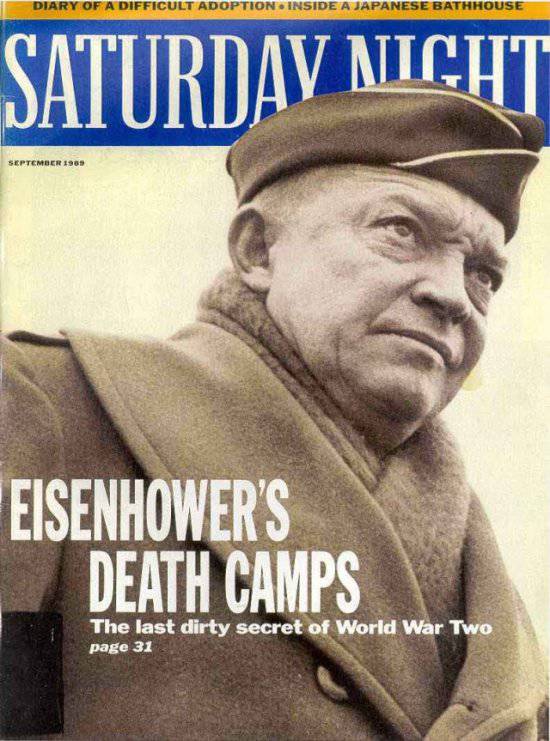
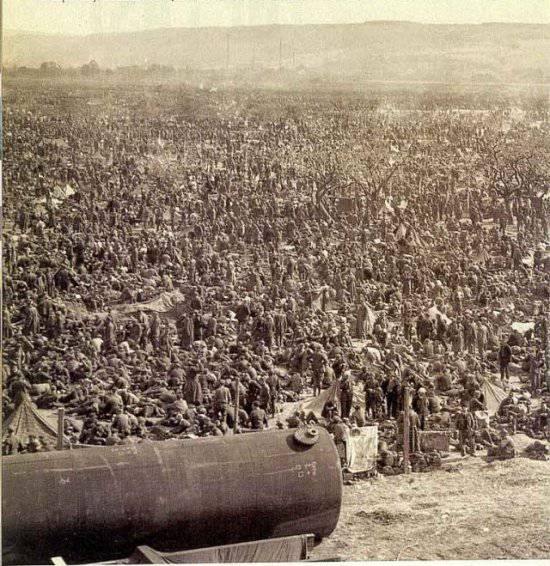
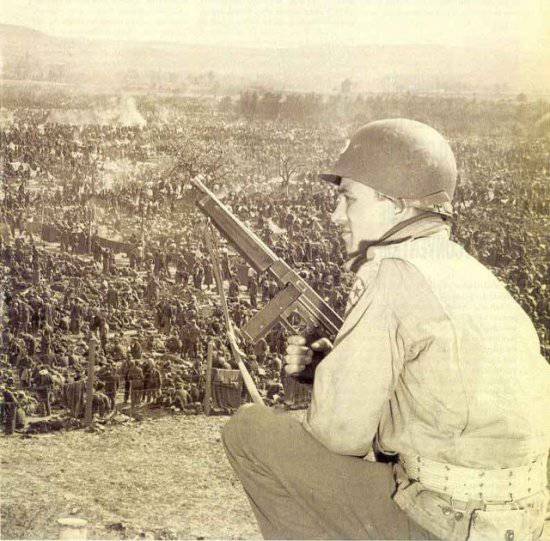
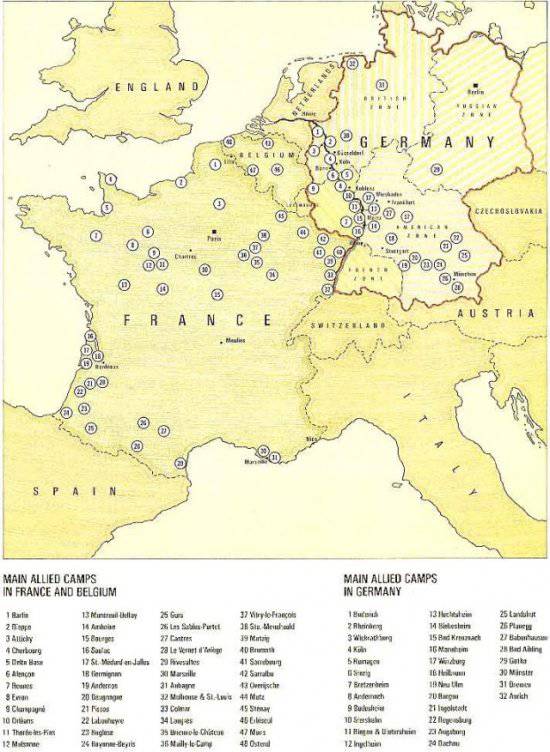
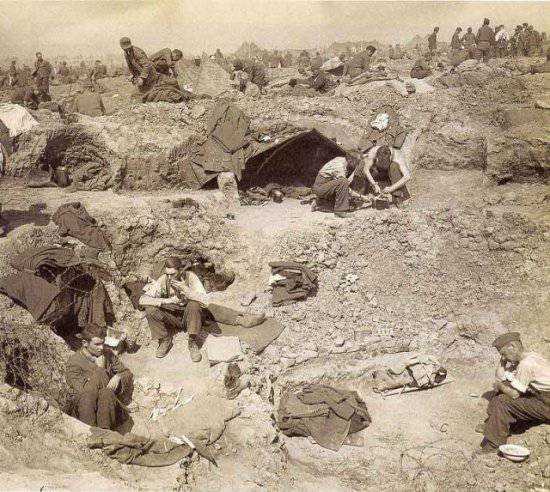
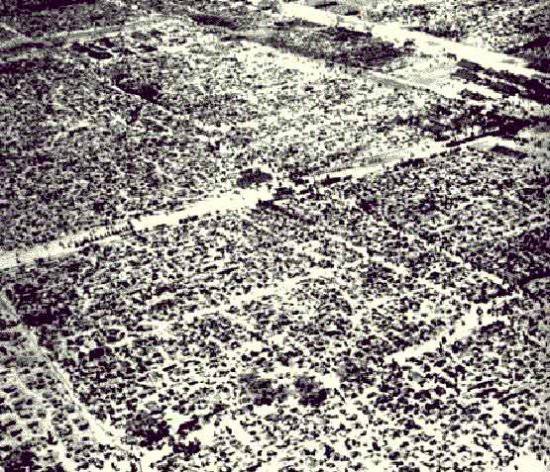
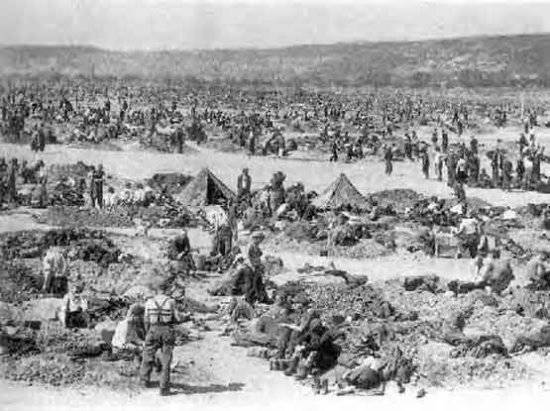
Information